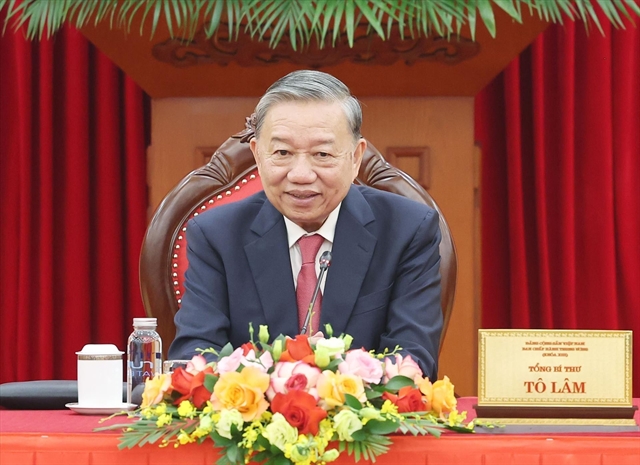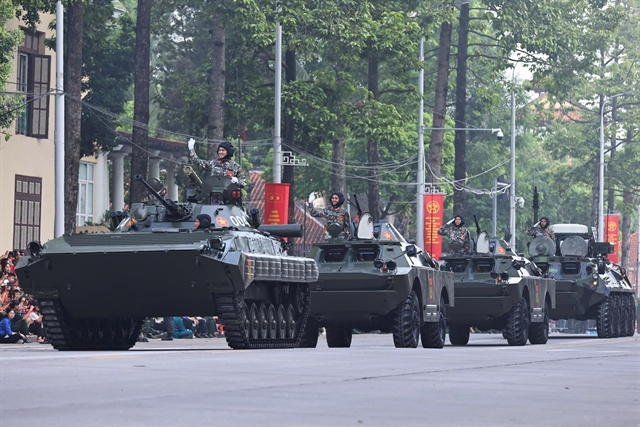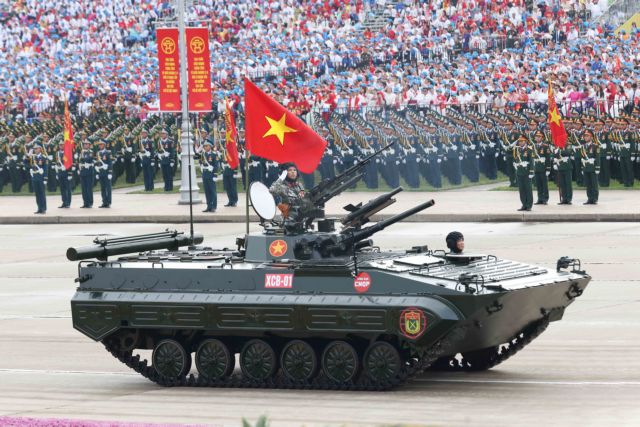 Politics & Law
Politics & Law

 |
| BMP-1 amphibious infantry fighting vehicles and a PR-DM-60-PU communications command vehicle parade on Hùng Vương Street, Hà Nội on September 2.— VNA/VNS Photo Minh Đức |
HÀ NỘI — The General Department of Defence Industry was told to focus on upgrading and enhancing the performance of its weapons, equipment and technical systems, while also pursuing research and development of next-generation armaments on par with global standards.
The directive was issued on Wednesday by Senior Lieutenant General Lê Huy Vịnh, member of the Party Central Committee, Deputy Minister of National Defence and Standing Deputy Head of Steering Committee 3488.
Vịnh said that the general department should prioritise the manufacture of complete, integrated products rather than focusing solely on isolated technological components.
According to Vịnh, each final product should combine multiple technologies. For example, if 10 technologies are integrated, the department must be able to master at least five, while cooperating with partners to gradually master the remainder.
He also highlighted the importance of a comprehensive workforce development strategy, covering both incentives and training.
The general department needs to secure skilled workers early on, by identifying capable students from universities inside and outside the military and offering training from their second or third year.
Meanwhile, the department must also clearly define its core fields of strength to concentrate investment and development.
 |
| An XCB 01 infantry fighting vehicle developed and manufactured by the General Department of Defence Industry during the parade at Ba Đình Square, Hà Nội on September 2.— VNA/VNS Photo Phương Hoa |
Reporting on recent progress, Lieutenant General Hồ Quang Tuấn, head of the general department, said that its Party Committee had thoroughly disseminated and implemented Resolution 57-NQ/TW, Resolution 3488-NQ/QUTW and related instructions from the ministry across its agencies and units.
As a result, awareness has been raised regarding the crucial role of science, technology, innovation and digital transformation, while advisory, management and implementation processes have seen marked improvements.
Scientific and technological activities have been strengthened, with eight new urgent and large-scale programmes and projects launched to support the research and production of strategically significant military equipment.
Four key programmes and independent projects have been effectively implemented, meeting both deadlines and quality requirements.
Notably, the department successfully developed three types of equipment in time for use during military parades for the 80th anniversary of the August Revolution and National Day on September 2.
The Party Committee of the general department has proposed that the ministry approve several pressing science and technology programmes to quickly deliver products into service.
It also recommended greater decentralisation of authority for scientific research tasks within the military, and the establishment of a science and technology ecosystem within the general department.
The ministry was urged to continue supporting the general department in implementing leadership directives and in driving breakthroughs in science, technology, innovation and digital transformation in the years ahead.— VNS



.jpg)
